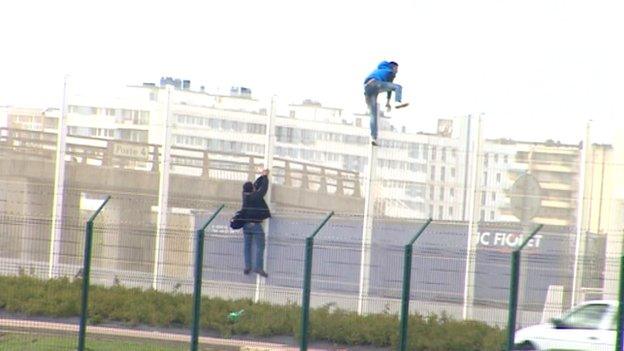Illegal immigrants smuggled out of UK and back again
- Published
An undercover journalist filmed 21 people being trafficked out of Dover in the back of lorries
Illegal immigrants are being smuggled out of the UK via Dover to evade deportation then smuggled back, a BBC investigation has found.
An undercover journalist filmed 21 illegal immigrants inside a lorry being taken on to a ferry and into France. Most said they intended to return.
John Vine, former Independent Chief Inspector of Borders and Immigration, said the film exposed serious issues.
The Port of Dover said exit checks were being introduced at ports from April.
Illegal immigrants leave the UK to evade deportation by the authorities here, but some are being smuggled back in to the UK after being registered as asylum seekers in Italy.
An asylum loophole means that, if then caught in the UK, they are likely to be returned to Italy rather than their country of origin.
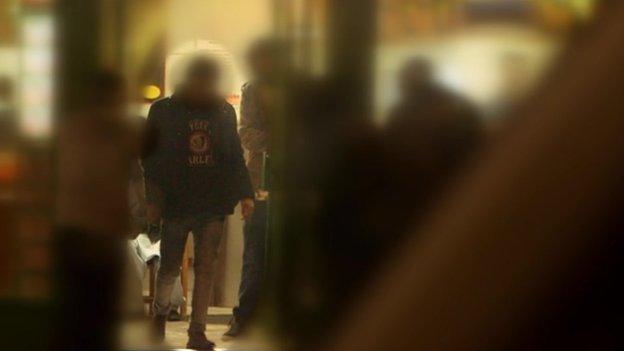
Ajmal handed over £300 to the smugglers at a fast food restaurant in Walthamstow
The illegal immigrants were filmed secretly inside the lorry by Afghan journalist Ajmal, posing as an illegal immigrant.
He had been told by a UK-based people smuggler he could be smuggled out of the country almost any day of the week for £300.
Ajmal handed over the cash to the people smugglers in Walthamstow, east London, and was driven in a people carrier to Detling, Kent with seven illegal immigrants.
The driver demanded another 100 euros from each person.
All eight were transferred to a lorry parked in a layby.
The truck, which already had 14 illegal immigrants on board from Birmingham and Manchester, entered the Port of Dover at 23:45 GMT, driving past Kent Police officers and British and French passport controls.
It waited for four hours before boarding a Dunkirk ferry.
The journey ended at Veurne on the Belgian border, from where some illegal immigrants were being driven on to other European destinations.
Ajmal was told how to get to the nearest railway station and that the gang would smuggle him back to the UK if he wished - but the price for the return trip would be £1,200.
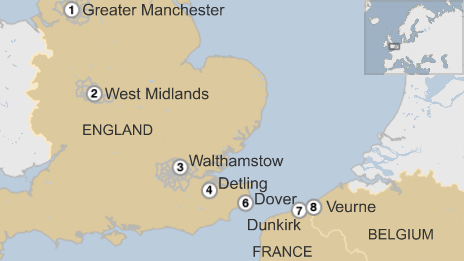
The illegal immigrants in the lorry told Ajmal they were Pakistani and Indian nationals, with three from Afghanistan.
Some said they had entered the UK on student visas, while others came illegally and were now fleeing possible deportation.
Most told Ajmal they intended to return to Britain again using criminal gangs.
BBC South East later confronted two members of the gang, who both denied being people smugglers.

Why do illegal immigrants want to be smuggled out of UK?
It enables them to avoid deportation from the UK and also to exploit an asylum loophole that allows them to stay in Europe.
They travel to Italy, where they claim asylum and are then free to leave - they then return to Calais to be smuggled back into the UK.
A Home Office spokesman said if an illegal immigrant is discovered in the UK they are detained and in most cases they make a claim for asylum. They are then deported to their home country where their appeal can be heard.
But if they began the asylum process in Italy, they are taken back there for their asylum claim to be processed.

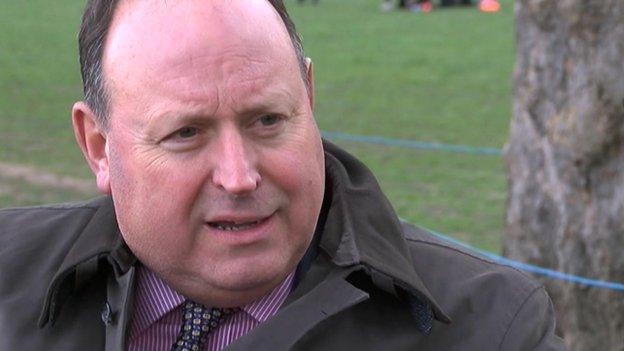
John Vine, former chief inspector of Borders and Immigration said the investigation exposed a serious issue
Mr Vine, external said the extent of the trade exposed in the BBC footage was shocking.
"Most people think illegal immigrants are trying to get into the UK," he said.
"All the efforts of the authorities are focused on preventing people from coming here illegally.
"I don't think people realise the extent of the trade of shipping people out of the UK into other parts of Europe and elsewhere in the world.
"I think it exposes an issue the authorities need to look at very seriously."
'Firm action'
The UK government has introduced exit checks at all ports, airports and Eurotunnel effective from 8 April.
A spokeswoman for the Home office said the UK offered sanctuary to those who "genuinely need our protection " but took firm action to prevent illegal migration and the "abuse of our asylum system".
"A joint task force of the National Crime Agency, Border Force and Immigration Enforcement teams is working closely with European investigators to disrupt the organised crime behind illegal migration," she added.
The Port of Dover said all freight customers would be asked to present passports or national identity cards at check-in.
Colin Campbell's full report was shown on BBC South East Today at 18:30 GMT on Thursday.
- Published25 February 2015
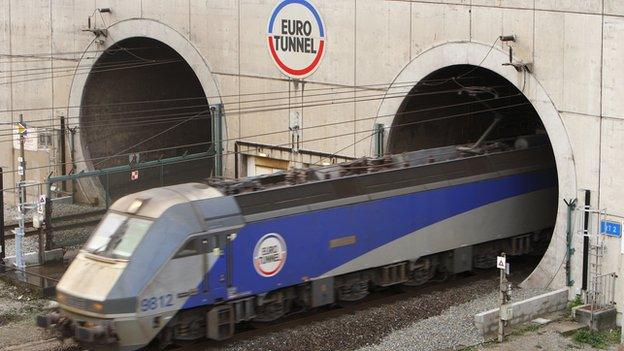
- Published4 September 2014
